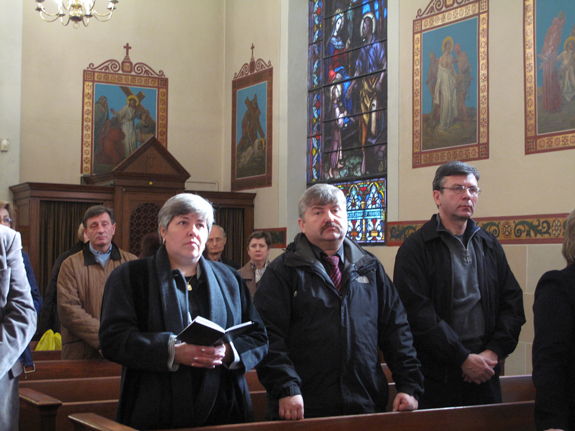
As Russian troops continue their military invasion of Crimea, a strategic peninsula in Ukraine, local Ukrainian Catholics fear Russian aggression will once again bring havoc to their homeland and the rest of the world.
“(Vladimir) Putin looks like a huge devil for the whole world. If nobody is going to stop him, he will re-create the Soviet Union,” said Lioudviga Roliouk, parishioner of Holy Ghost Ukrainian Catholic Church, Williamsburg, referring to the Russian president.
Roliouk said there are no earthly forces powerful enough to curtail Putin’s ambitions, which, she said, could spread outside the former Soviet bloc. She fears he may be bold enough to go after Alaska and then California, where there are Russian communities he may claim he needs to protect.
“If war is going to start, it is going to be nuclear,” she fears.
Therefore, local Ukrainian Catholics have put their faith in forces stronger than human armies and weapons.
“God has not abandoned us,” said Holy Ghost parishioner Oleksandra Pradivus. “Mary is praying for us.”
However, she believes that prayer must accompany action. Although she does not yet know what it will take to bring about peace and secure Ukraine’s freedom, people everywhere should pay attention.
“Putin is hurting the whole world,” she said. “Everyone must do what they can.”
Pradivus and Roliouk are part of Mothers in Prayer, an international prayer network. The Holy Ghost chapter has been organizing special prayer events in petition for the safety of their homeland, including a day of 2,000 Hail Marys.
Prayer is essential, said Father Ican Tyhovych, pastor of Holy Ghost.
“It is a very difficult time for Ukraine,” the pastor said. “There are a lot of different forces trying to divide the country … They want to break that kind of unity that we had for so many years.”
He said the Ukrainian faithful in the U.S. must send a clear message of unity to those in Ukraine and continue to pray for their homeland.
Antonina Juszczak, who has been a parishioner of Holy Ghost since she came to the U.S. 54 years ago, says she will not forget her ancestral homeland.
“This is a very bad situation,” she said. “We all try to help them. Pray for them. That’s our roots!”
Juszczak was born in Poland but is of Ukrainian heritage and has been part of the Ukrainian Catholic Church since her parents had her baptized. Ukrainain Catholics follow an Eastern rite but are in full communion with the Catholic Church in Rome and the pope.
The Ukrainian nation is no stranger to foreign forces threatening its sovereignty. Military threats and dishonest treaties kept the country under the rule of Poland and then Russia for centuries. Though the country was able to declare its independence in the early 20th century, it soon became a Soviet republic. Ukraine once again became a sovereign nation on Aug. 24, 1991.
With its newly won independence, Ukraine became the world’s third largest nuclear power. It voluntarily gave up thousands of nuclear warheads in accord with the Budapest Memorandum on Security Assurances. The U.S., Russia and the U.K. all signed the agreement, promising to respect the sovereignty of Ukraine. Russia violated the agreement when troops invaded Crimea.
“There’s a feeling that there never had been an independent Ukraine – that it was always a Soviet puppet,” said parishioner Mihailo Pradivus, speaking of the events of the 20th and 21st centuries.
Mihailo, who is married to Oleksandra, was born and raised in Siberia. Though he had a limited fluency of Ukrainian, he was able to gain admittance to a university in his ancestral homeland in 1976 at the age of 17.
‘Country of Dreams’
“For me it was a country of dreams,” he said. “You see fruits above you in the summer. You can pick them and eat them.”
Now living in the U.S., Mihailo continues to have a deep respect for Ukraine. As a way to honor Ukraine, on March 9 he participated in a parochial presentation in honor of the 200th anniversary of the birth of Taras Shevchenko, a cultural hero of the Ukrainian people.
Shevchenko was a poet, writer and political activist at a time when Ukraine was under Russian rule.
Parishioner Olga Deineko introduced the event as a way to honor Ukraine’s cultural father, who brought the hope of freedom to his people. During her introduction, she quoted one of Deineko’s poems:
“Keep fighting – you are sure to win
God help you in the fight!
For Fame and freedom March with you,
And right is on your side.”
Honoring their cultural achievements is one of the ways the Ukrainian people have been able to maintain their heritage in the face of foreign rule.
Roliouk said Ukrainians have a beautiful heritage and a culture based on hard work. She said walking down a street in Ukraine, one would see beautiful houses with gardens, made rich not by the wealth of the owners but by their hard work. She said they have been able to maintain their dignity and identity for centuries, but it has not been easy.
“How many years do we have to survive?” she wondered, worrying about her mother who still lives in Ukraine.
Despite the difficulty and the longevity of the struggle, Mihailo said one thing is constant: “Hope always, always we have hope … We believe in God.”
Roliouk said it’s faith that will save Ukrainians: “We are a people. We are a nation. We never kneel for Putin. We kneel for God!”

